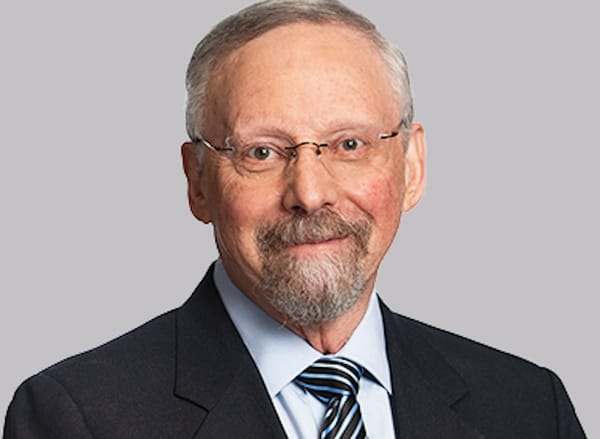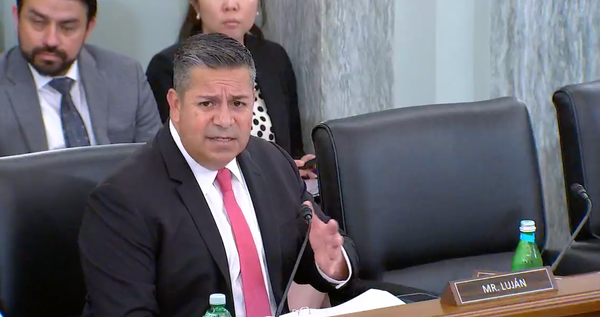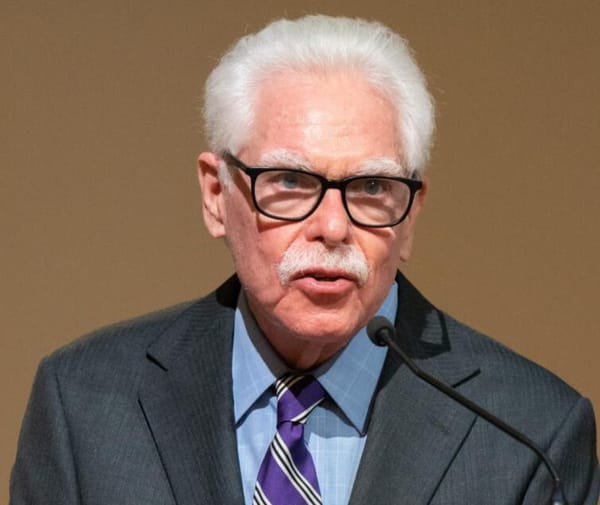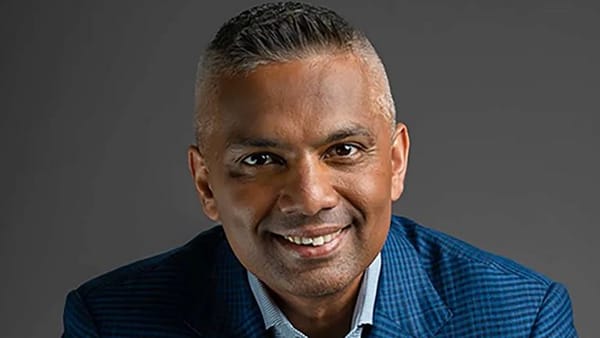Infrastructure Money Must Go to Better Networks — Even If in Areas with Existing Infrastructure
Some are warning that federal infrastructure money should not go toward subsidizing old networks.

WASHINGTON, January 13, 2022 — At a Broadband Breakfast event Wednesday, key broadband industry figures spoke about the value of using federal money to build higher quality networks in areas with existing infrastructure, punting the often negative connotations associated with “overbuilding” in certain areas.
While some believe that overbuilding – a term referring to networks built in areas with existing broadband infrastructure – is a real problem, others say the bad often gets conflated with the good.
“We also use the term newbuilding,” said Chip Pickering, CEO of INCOMPAS, a trade association for telecom competition. “And I think that’s what our objective is.
“The failure, I think, of our subsidy policy over the last two, three decades is that we subsidize the maintenance of old networks,” he said at the Wednesday event. ”My fear of failure in this round of funding would be if we subsidized the past instead of funding the future.”
Drew Clark, editor and publisher of Broadband Breakfast and host of Wednesday’s event, said that “overbuilding” has received a bad rap when it can mean real competition. So instead of having the same slow speeds, internet service providers – either incumbents or competitors – would be incentivized to upgrade their services in the area.

Claude Aiken, CEO of the Wireless Internet Service Providers Association, and Broadband Breakfast Editor and Publisher Drew Clark
Instead of waiting for another company to move in and start building faster broadband with government funds, smaller companies could apply for the government funds themselves, the event heard. These smaller companies could then use the funds to build better networks.
Wednesday’s discussion included a deeper dive into the Infrastructure Investment and Jobs Act, which includes $65 billion for broadband. States are currently preparing to accept a substantial chunk of that money from the National Telecommunications and Information Administration.
Matt Polka, president and CEO of ACA Connects, an association with small service providers, spoke to the importance of states and broadband providers using the money granted through the IIJA in the “wisest and most effective ways.” Part of this, according to panelist Claude Aiken, CEO of Wireless Internet Service Providers Association, would be to “educate folks about the impact” of broadband.
Polka raised concerns about how involved localities should be in competitive service prices. He said that states and localities shouldn’t regulate rates for services and let competition, or the market, drive those low prices. Discussion of rate setting often emerges with government ownership of the network.
“History has answered that question: competition does work,” said Polka.
Pickering also spoke about how members need to encompass every technology. According to Pickering, there is a need for a system that incentivizes people to build the fastest broadband speed. The IIJA legislation includes a provision making funding technology agnostic.
In the middle of these two viewpoints was Aiken. While emphasizing the importance of not hampering the ability of companies to meet consumer needs, Aiken spoke to how hard it is to know what will work and what won’t work with certainty.
But, he continued, it’s “incumbent upon us to get the details right.”
There are two ways to participate in this event: IN PERSON or LIVE ONLINE. To attend in person, sign up to attend in person through Eventbrite. Please arrive for lunch at Clyde’s of Gallery Place, 707 7th Street NW, Washington, D.C., by 11:30 a.m. to be seated for lunch. The program will begin promptly at 12 Noon ET.
Our Broadband Breakfast Live Online events take place on Wednesday at 12 Noon ET. You can watch the January 12, 2022, event on this page. You can also PARTICIPATE in the current Broadband Breakfast Live Online event. REGISTER HERE.

Wednesday, January 12, 2022, 12 Noon ET — Broadband Breakfast for Lunch: The Agenda of Key Internet and Technology Stakeholders for 2022
With 2021 in the rearview mirror, Broadband Breakfast will take the pulse of telecom, media and technology industry stakeholders. What’s on their agenda for 2022? Early in the year, implementation of the Infrastructure, Investment and Jobs Act will dominate many broadband groups’ regulatory bandwidth. But what of Congress and of the Federal Communications Commission? Will net neutrality be back on the agenda, and when? What role will debates about big technology companies’ market dominance play on legislation dealing with online privacy and the regulation of social media? And what do entertainment industry players hope for in the New Year? Join us IN PERSON or LIVE ONLINE as Broadband Breakfast returns to its traditional role as the preeminent monthly gathering place for Washington discussions about broadband policy and internet technology.
There are two ways to participate in this event: IN PERSON or LIVE ONLINE. To attend in person, sign up to attend in person through Eventbrite. Please arrive for lunch at Clyde’s of Gallery Place (The Piedmont Room), 707 7th Street NW, Washington, D.C., by 11:30 a.m. to be seated for lunch. The program will begin promptly at 12 Noon ET.
Panelists for this Broadband Breakfast Live Online session:
- Matt Polka, President and CEO, America’s Communications Association Connects
- Chip Pickering, CEO, INCOMPAS
- Claude Aiken, CEO, Wireless Internet Service Providers Association
- Drew Clark (moderator), Editor and Publisher, Broadband Breakfast

Matt Polka is the President and CEO of ACA Connects – America’s Communications Association (ACAC), a 700-member Washington, D.C., trade and federal advocacy association of independent, smaller- and medium-sized broadband, cable and phone businesses. ACACmembers serve more than 10million subscribers in smaller/rural markets and competitive areas in all 50 states. Matt has been with the organization since 1993.
Chip Pickering is the CEO of INCOMPAS and has served in that role since 2014. He is also a former representative of Mississippi’s 3rd congressional district. He holds a BBA from the University of Mississippi and an MBA from Baylor University.
Claude Aiken is CEO of the Wireless Internet Service Providers Association (WISPA), an association representing thousands of fixed wireless providers. In the decade prior, Aiken worked at the Federal Communications Commission as an advisor to Chairman Tom Wheeler and Commissioner Mignon Clyburn, as well as in various staff attorney roles and in senior leadership positions in the Wireline Bureau and Office of General Counsel. He graduated from New York Law School as a John Marshall Harlan Scholar specializing in information and technology law.
Drew Clark is the Editor and Publisher of BroadbandBreakfast.com and a nationally-respected telecommunications attorney. Drew brings experts and practitioners together to advance the benefits provided by broadband. Under the American Recovery and Reinvestment Act of 2009, he served as head of a State Broadband Initiative, the Partnership for a Connected Illinois. He is also the President of the Rural Telecommunications Congress.
WATCH HERE, or on YouTube, Twitter and Facebook.
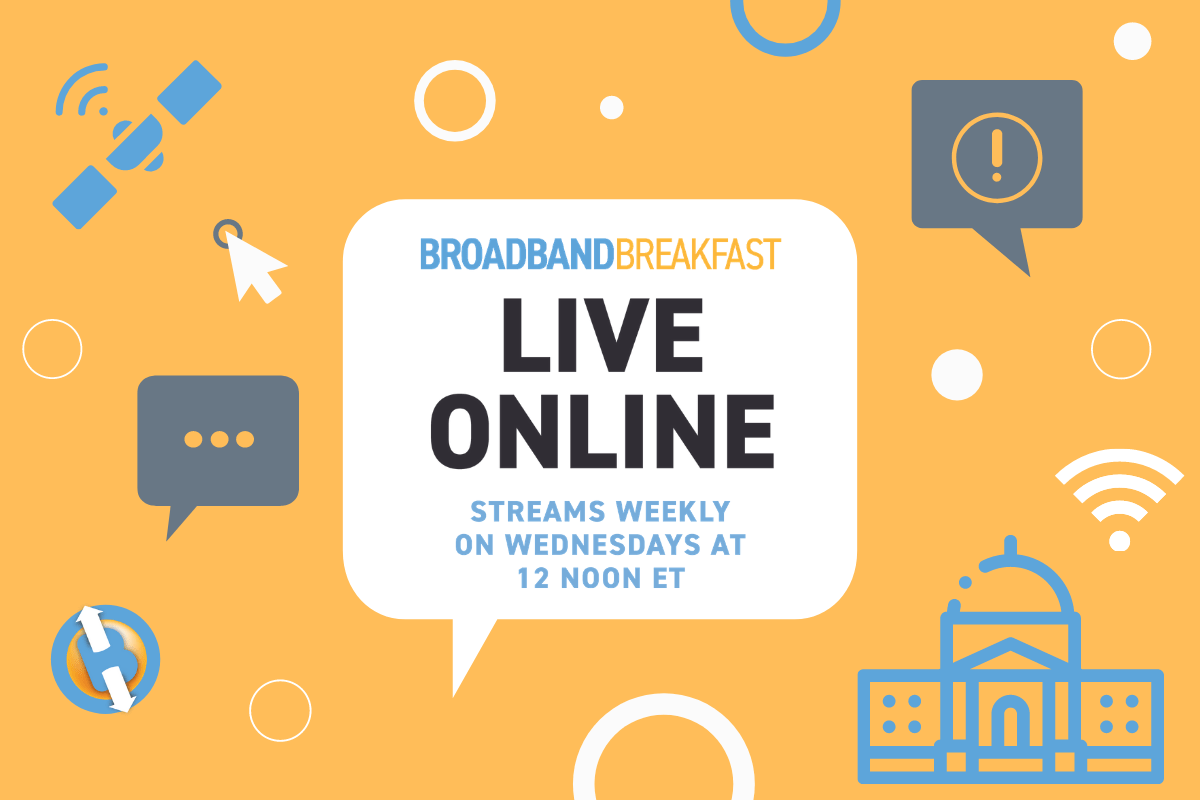
As with all Broadband Breakfast Live Online events, the FREE webcasts will take place at 12 Noon ET on Wednesday.
SUBSCRIBE to the Broadband Breakfast YouTube channel. That way, you will be notified when events go live. Watch on YouTube, Twitter and Facebook.
See a complete list of upcoming and past Broadband Breakfast Live Online events.


